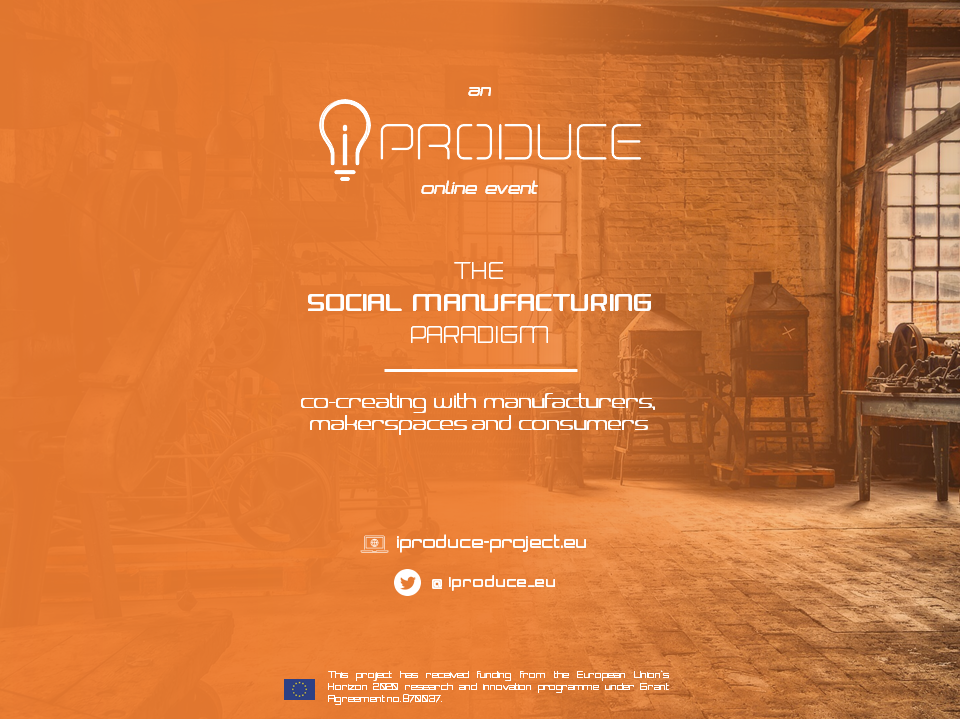Building an open and innovative social manufacturing framework: knowing the turning points, eliminating uncertainties, and establishing governance
[Valencia, London, 1 December 2020] iPRODUCE held its first online event last 26 November 2020 titled “The Social Manufacturing Paradigm: co-creating with manufacturers, makerspaces, and consumers”. The event was organised with the objective of discussing the role of consumers and makers in the social manufacturing landscape, one which promotes the participation among individuals and the industry. iPRODUCE was pleased to have David Cuartielles and César García as its keynote speakers, as well as Jessica Guy and Pablo Muñoz from Pop-Machina and Robert Mies from the OPENNEXT projects. The event started with a presentation of iPRODUCE by the project coordinator, Manuel Sánchez (AIDIMME), with partners Dimitris Chapizanis (White Research) and Ria Pechlivani (CERTH) having provided an overview of users and stakeholders’ requirements and motivations – based on a large-scale survey – and the iPRODUCE digital platform for social manufacturing, respectively. David Cuartielles (Malmö University) presented “Platform Design: the moving governance model” focusing on his experience as co-founder of the Arduino project and member of the Coronavirus movement, addressing both platforms (their similarities and differences) and the governance built around them. Highlights include the importance of governance in the establishment of platforms and how it evolves over time, which also plays an important role in the platforms’ own sustainability. César García (La Hora Maker) presented “Crossing the maker chasm”, discussing the relationships between three stakeholders – consumers, makers, and manufacturers – in social collaboration activities, and the aspects to consider in the bi-directional relationships. Among the many points presented, important questions were also left for future discussions, related to making standards available to makers, the relationships between maker institutions and emergent makers, and the monitoring of projects to avoid redundancy. The representatives from the two invited projects that collaborate with iPRODUCE presented their projects and work being developed that falls under the umbrella of social manufacturing. Jessica Guy and Pablo Muñoz presented how Pop-Machina is working with circular economy, how they are working with makers to empower people to become actors of change, and how their pilots, a social collaboration platform and the Pop-Machina Academy is driving an impactful change. Robert Mies presented how OPENNEXT is encouraging SMEs to unleash open-source hardware’s potential through engagement in collaborative design of products together with fab labs and maker spaces, and work being developed within a selection of pilots towards that ambition. The online event wrapped up with a round table that discussed the key triggers to enable a successful social manufacturing framework. Key ideas that were shared include the need to better know the paths required for projects and the turning points that need to be faced, as well as the key issues to be tackled along that path. It was considered that the existing uncertainty in many situations is still a barrier to success, even for makers. Another idea circulated was the importance of bridging the gap between stakeholders, namely existing institutions, those that do research and those that are ‘on the ground’ and on-site actively participating. By engaging in transparent collaborations and conversations, using bottom-up approaches, it is easier to identify existing needs. Lastly, the importance of governance was again referred. It was mentioned that having a clear governance structure is important to ensure trust and to engage stakeholders to participate. Participated by nearly 70 people from academia/research institutions, SMEs and industry, the event was a milestone to foster discussions on the topic of social manufacturing, one that iPRODUCE will continue to explore and develop in the coming months.
Keywords
event, social manufacturing, makers, makerspaces, diy, co-cration, co-design, paradigm, manufacturers, manufacturing, consumers, prosumers, technologies



